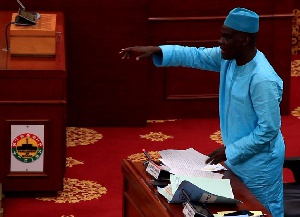The Minority Leader in Parliament, Haruna Iddrisu, has called on Parliament to accept some of the blame and responsibilities for not keeping the executive arm of government in check in the performance of its functions.
According to him, Parliament must accept the blame for the government's excessive borrowing.
He said it was the responsibility of Parliament to check the excessive borrowing by the government, asking: "How did we get here?"
"Parliament's role as the defender of the people's interests is lost," he said.
He made the admission on Tuesday, December 20, 2022, during a roundtable with the core leadership of Parliament on harnessing the dividends of democracy over the last 30 years, organised by the Ministry of Parliamentary Affairs.
Democratic dividends refer to the benefits that a democratic system can provide for society.
Among these benefits are the provision of public goods and an institutionalised arrangement for carrying the people along in the discharge of the duties of the state.
The discussion was on the theme: 'Parliament and the harnessing of democratic dividends: Assignment.'
It brought together experts, including the Chairman of the National Media Commission (NMC), Yaw Boadu-Ayeboafoh, and Dr Maame Adwoa Gyeke-Jandoh, former Head of the Political Science Department at the University of Ghana, Legon.
The Minority Leader admitted that Parliament was always found wanting when it came to exercising its oversight due to intense partisanship.
He said the House struggled to determine what was best for the national interest against the interests of political parties.
Mr. Iddrisu said the consequences of excessive borrowing were being felt by "all of us."
He argued that Article 181 of the Constitution gave Parliament the sole right to approve the terms and conditions of all loans.
"So if the Minister of Finance's borrowing has exceeded 100 percent of GDP, how did we get here?" He asked.
He intimated that Parliament had become a "clearing house," approving Executive members nominated to serve, without scrutinizing them and telling them in the face "that their conduct is not good enough."
"The Parliament of Ghana is contributing, through acts of commission or omission, to eroding public faith and confidence in our democracy," he stressed.
General News of Wednesday, 21 December 2022
Source: classfmonline.com
Blame parliament for government’s reckless borrowing – Haruna Iddrissu
Entertainment
















